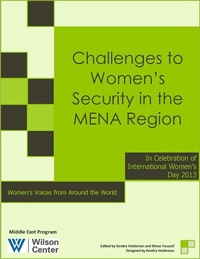-
After the Arab Spring, Challenges Intensify for Women in the Middle East and North Africa
March 8, 2013 By Wilson Center Staff
Excerpted below is the introduction, by Haleh Esfandiari, to Challenges to Women’s Security in the MENA Region. The full report is available for download from the Wilson Center’s Middle East Program.
On the occasion of International Women’s Day 2013, the Middle East Program at the Wilson Center invited a cross-section of women activists, politicians, academics, and entrepreneurs to give us their views on the challenges women face to their security. This publication, “Challenges to Women’s Security in the MENA Region,” includes pieces from 42 women from 20 countries, including the United States, Malaysia, Indonesia, and countries in the Middle East and North Africa (MENA) shared with us their concerns, disappointments, and hopes for women in the region.
Excerpted below is the introduction, by Haleh Esfandiari, to Challenges to Women’s Security in the MENA Region. The full report is available for download from the Wilson Center’s Middle East Program.
On the occasion of International Women’s Day 2013, the Middle East Program at the Wilson Center invited a cross-section of women activists, politicians, academics, and entrepreneurs to give us their views on the challenges women face to their security. This publication, “Challenges to Women’s Security in the MENA Region,” includes pieces from 42 women from 20 countries, including the United States, Malaysia, Indonesia, and countries in the Middle East and North Africa (MENA) shared with us their concerns, disappointments, and hopes for women in the region.
In 2010 and 2011, when the Arab Spring spread from Tunisia to Egypt, Libya, Yemen, Syria, and other countries in the MENA region, women from all walks of life appeared in the tens of thousands alongside men in the streets of Arab cities. They took part in street demonstrations and sit-ins. They addressed the crowds, calling for individual dignity, government accountability, and the rule of law. They pushed for democratic change. In that brief, heady moment, barriers between men and women in the public sphere seemed to be crumbling, and women felt as secure and as protected on the streets across the Arab world as they felt at home.
But once the revolutions succeeded, the ugly face of discrimination and violence against women reappeared. There were those intent on forcing women out of the public sphere by making the streets unsafe for them.
Today, in Egypt, Syria, Bahrain, and other countries, women are experiencing physical violence against their persons in the form of rape, beatings, arrests, prison, and torture. There is more. Women political activists are subjected to virginity tests. Little girls are forced into marriage. Under the threat of physical punishment, women are told what to wear and how to behave in public.
Women face a creeping segregation; they are being pushed out of the political arena and the workplace. The number of women in public and political office in a number of Arab countries is actually falling. Only a handful of women were elected to the now disbanded Egyptian parliament and to the constitutional assembly. The number of women holding cabinet posts in Egypt, Tunisia, and Iraq has declined sharply. As the economic situation worsens in the countries of the Arab Spring, women are the first victims in the workplace. The traditional view that men are the main, if not the sole, breadwinners in the family is returning with a vengeance.
The new constitutions of Egypt and Tunisia are vague on women’s rights, while the push in these and other countries for adherence to shari’a threatens women’s aspiration for equality under the law. Here, the experience of Iranian women should serve as a warning to women in the countries of the Arab Spring: the 1979 Islamic constitution, defining women’s rights under Islamic law, has meant institutionalizing unequal status. Iranian women have been waging a 30-year struggle to regain lost rights.
There are other danger signs. Progressive personal status laws in the countries of the Arab Spring are under threat. In Egypt, there was a move to lower the marriage age for girls to nine and to permit female genital mutilation. In Egypt, Libya, and Tunisia, there is talk of permitting polygamy once again – although polygamy and female genital mutilation are both barred under current laws.
Governments in the region – signatories to the Convention on the Elimination of Discrimination Against Women (CEDAW) and UN Security Council Resolution 1325 on women, peace, and security – openly flout their international undertakings. In many countries, women can no longer obtain the necessary protection for their persons under either domestic laws or under international conventions.
2013 is the year for an all-out effort by women’s organizations, the private sector, civil society institutions, NGOs, and individuals to ensure the enactment and enforcement of laws to protect women against violence and marginalization.
Topics: Africa, democracy and governance, demography, Egypt, From the Wilson Center, gender, Libya, Middle East, security, Syria, Tunisia, Yemen, youth
 A Publication of the Stimson Center.
A Publication of the Stimson Center.



